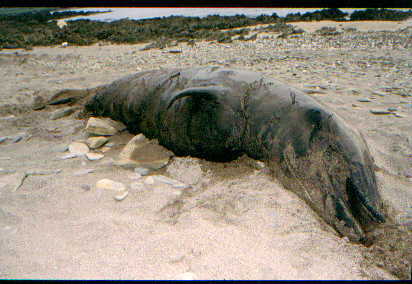Several dead Cuvier’s beaked whales found along Irish coast last weekend

August 9th, 2018
Three Cuvier’s beaked whales were found washed up at different locations along the coast in counties Donegal and Mayo last weekend.
The dead sea animals were found on Sheephaven Bay on Gola Island in Co Donegal and at Tiraun on the Mullet Peninsula in Co Mayo.
A long-finned pilot whale was also found dead on Cross Beach, Co. Mayo close to one of the stranded Cuvier’s whale.
The Department of Heritage together with the Marine Institute carried out an examination to try and determine the cause of death.
However, the animals have been dead for some time and are in “poor condition”, a department spokesperson said. This makes identification of the cause of death virtually “impossible.”

Cuvier’s beaked whale washed up on the beach Photo: IWDG
According to the Irish Whale and Dolphin Group (IWDG), the similar conditions of all three animals indicate that the whales died at around the same time.
Three to four stranding events in a year would be “relatively normal”, the conservation group said, making last weekend’s discoveries “highly unusual”.
The most recent mass-stranding recorded on Irish coast occurred between December 2014 and January 2015 when around 20 beaked whales washed up in Ireland and Scotland coasts. The Department of Heritage reported that this was linked to a sonar activity.
Sonar activity can damage the navigational and communication abilities of deep diving whales, the Department said, leading to the animal’s death.
Cuvier’s beaked whales, known as the deepest divers from all marine mammals, are extremely sensitive to acoustic disturbances. Previous research has found links between mass-stranding events and military exercises at sea.
The research published in 2009 showed that the loud noises of military sonars used by the navy forces whales to flee away and might damage their eating cycle.
Simon Berrow, the Chief Science Officer at the IWDG said that an unusual stranding event suggests that something has happened offshore to affect these whales. “It might be naval exercises or other sources of acoustic trauma, or maybe it’s just natural.”
Dr Berrow encouraged competent authorities to contact British and other navies operating in Irish waters to request information about their recent activities.
[x_author title=”About the Author”]







